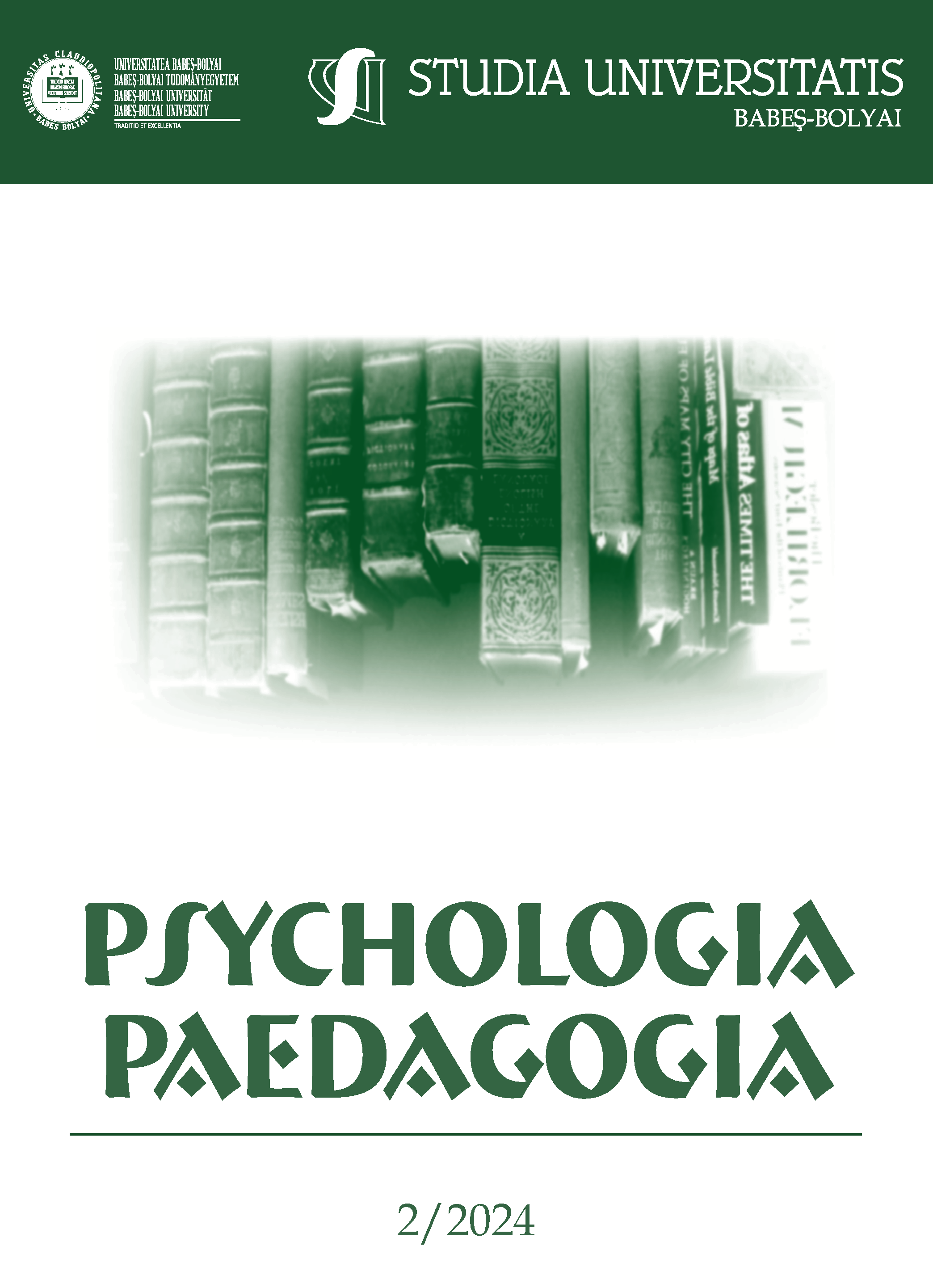Implicit and Explicit False Memories conditioned by lapse of time
DOI:
https://doi.org/10.24193/subbpsyped.2024.2.03Keywords:
False memories, implicit false memories, explicit false memories, true memories, delayAbstract
False memories represent distorted memories which are remembered incorrectly or didn’t happen at all in reality. In the present study, the period of time between encoding and testing has been manipulated, in order to explore the effects of delay on implicit and explicit false memories. Two groups of subjects were tested, using the DRM paradigm, for false implicit and explicit memories. One group had no delay period between encoding and test phases, the other group was tested at one week delay after the encoding phase. Results showed no significant differences between implicit and explicit false memories. The delay had significant effect only for true memories, which were significantly lower after one-week delay. Conclusions and future directions of research are discussed.
References
Brainerd, C. J., & Reyna, V. F. (1996). Mere memory testing creates false memories in children. Developmental Psychology, 32(3), 467.
Brysbaert, M. & New, B. (2009) Moving beyond Kucera and Francis: A Critical Evaluation of Current Word Frequency Norms and the Introduction of a New and Improved Word Frequency Measure for American English. Behavior Research Methods, 41 (4), 977-990.
Cabeza, R., & Lennartson, R. (2005). False memory across languages: Implicit associative response vs fuzzy trace views. Memory, 13(1), 1-5.
Garfinkel, S. N., Dienes, Z., & Duka, T. (2006). The effect of alcohol and repetition at encoding on implicit and explicit false memories. Psychopharmacology, 188, 498-508.
Hicks, J. L., & Starns, J. J. (2005). False memories lack perceptual detail: Evidence from implicit word-stem completion and perceptual identification tests. Journal of Memory and Language, 52(3), 309-321.
Horoiţă, A., & Opre, A. (2020). False memories: Romanian Deese-Roediger-McDermott lists of words. Cognition, Brain, Behavior, 24(2).
Houben, S. T., Otgaar, H., Roelofs, J., Smeets, T., & Merckelbach, H. (2020). Increases of correct memories and spontaneous false memories due to eye movements when memories are retrieved after a time delay. Behaviour Research and Therapy, 125, 103546.
Jou, J., & Flores, S. (2013). How are false memories distinguishable from true memories in the Deese–Roediger–McDermott paradigm? A review of the findings. Psychological research, 77, 671-686.
Kawasaki, Y., & Yama, H. (2006). The difference between implicit and explicit associative processes at study in creating false memory in the DRM paradigm. Memory, 14(1), 68-78.
Loftus, E. F. (1979a). The malleability of human memory. American Scientist,67, 312–320.Loftus, E. F. (1979b). Reactions to blatantly contradictory information. Memory & Cognition, 7, 368–374.
Lövdén, M., & Johansson, M. (2003). Are covert verbal responses mediating false implicit memory?. Psychonomic Bulletin & Review, 10, 724-729.
Opre, A. (2012). Inconștientul Cognitiv. Polirom
Marini, M., Agosta, S., Mazzoni, G., Barba, G. D., & Sartori, G. (2012). True and false DRM memories: differences detected with an implicit task. Frontiers in Psychology, 3, 310.
McBride, D. M., Coane, J. H., & Raulerson III, B. A. (2006). An investigation of false memory in perceptual implicit tasks. Acta Psychologica, 123(3), 240-260.
McDermott, K. B. (1997). Priming on perceptual implicit memory tests can be achieved through presentation of associates. Psychonomic Bulletin & Review, 4, 582-586.
McDermott, K. B. (1996). The persistence of false memories in list recall. Journal of Memory and language, 35(2), 212-230.
McKone, E. (2004). Distinguishing true from false memories via lexical decision as a perceptual implicit test. Australian Journal of Psychology, 56(1), 42-49.
McKone, E., & Murphy, B. (2000). Implicit false memory: Effects of modality and multiple study presentations on long-lived semantic priming. Journal of Memory and Language, 43(1), 89-109.
Neuschatz, J. S., Payne, D. G., Lampinen, J. M., & Toglia, M. P. (2001). Assessing the effectiveness of warnings and the phenomenological characteristics of false memories. Memory, 9(1), 53-71.
Roediger, H. L., & McDermott, K. B. (1995). Creating false memories: Remembering words not presented in lists. Journal of experimental psychology: Learning, Memory, and Cognition, 21(4), 803.
Schacter, D. L., Gallo, D. A., & Kensinger, E. A. (2007). The cognitive neuroscience of implicit and false memories: Perspectives on processing specificity.
Tajika, H., Neumann, E., Hamajima, H., & Iwahara, A. (2005). Eliciting false memories on implicit and explicit memory tests after incidental learning. Japanese Psychological Research, 47(1), 31-39.
Van Damme, I., & d'Ydewalle, G. (2010). Incidental versus intentional encoding in the Deese–Roediger–McDermott paradigm: Does amnesic patients' implicit false memory depend on conscious activation of the lure?. Journal of Clinical and Experimental Neuropsychology, 32(5), 536-554.
Van Damme, I., & d'Ydewalle, G. (2009). Implicit false memory in the DRM paradigm: Effects of amnesia, encoding instructions, and encoding duration. Neuropsychology, 23(5), 635.
Downloads
Published
How to Cite
Issue
Section
License
Copyright (c) 2024 Studia Universitatis Babeș-Bolyai Psychologia-Paedagogia

This work is licensed under a Creative Commons Attribution-NonCommercial-NoDerivatives 4.0 International License.


